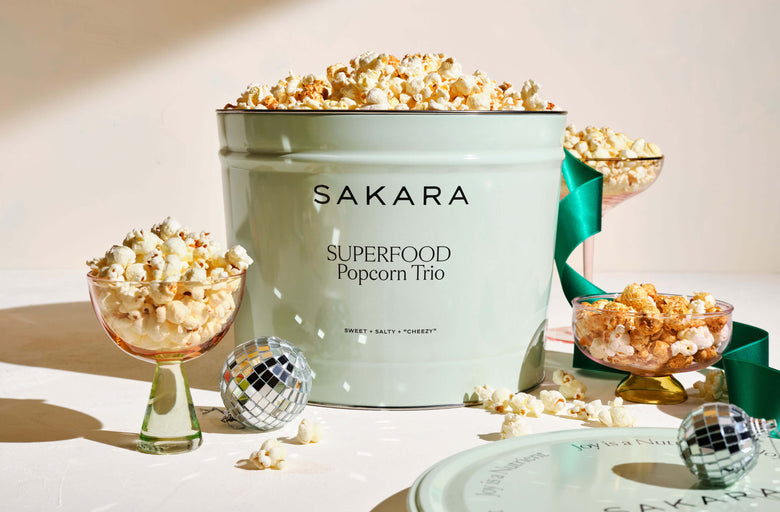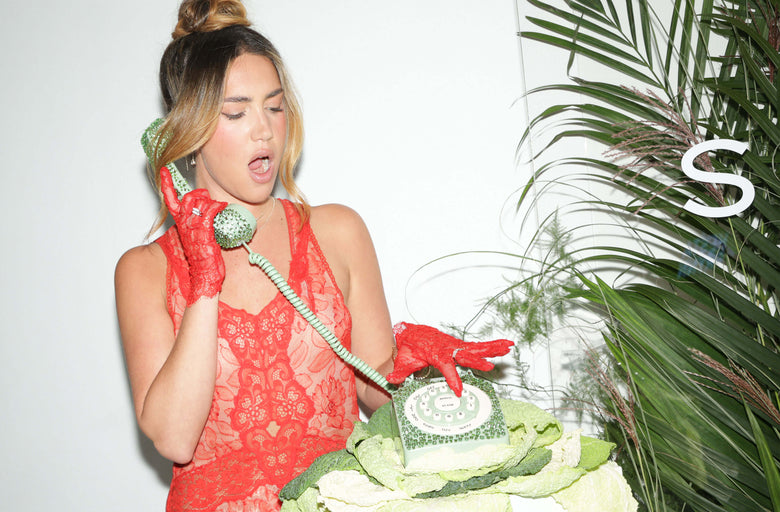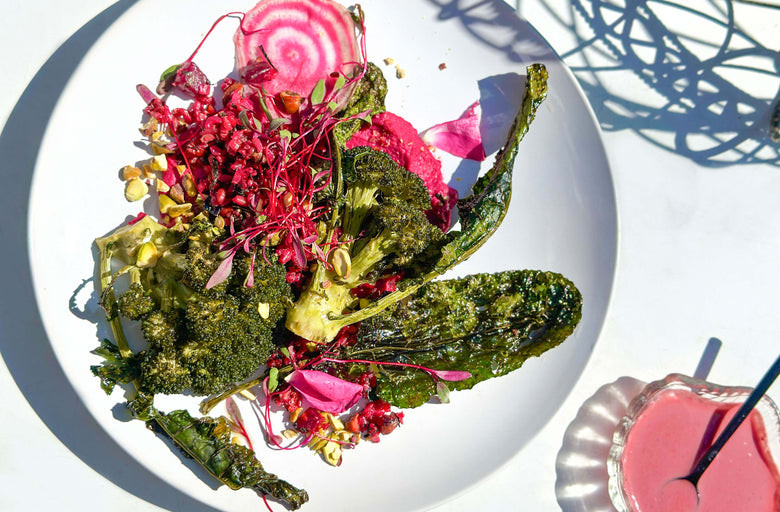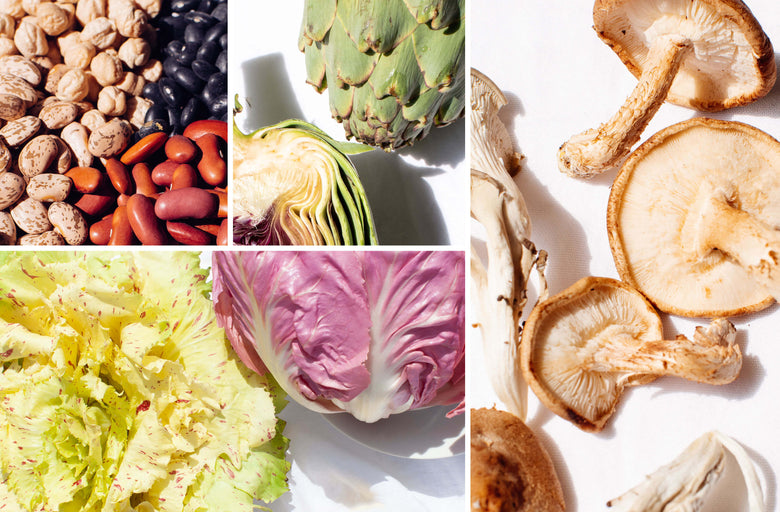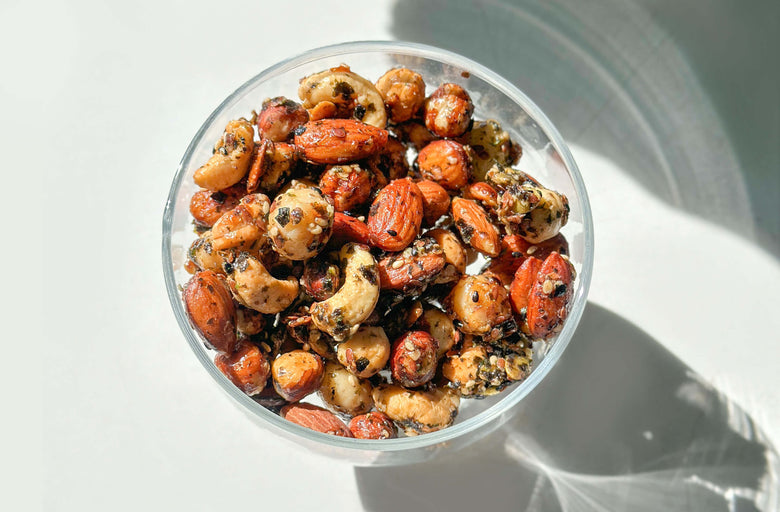Artist and designer Mara Hoffman doesn't simply create clothing, she creates worlds for strong, empowered, mystical beings to live in. From her inner well of love, respect, and a connection to something greater than herself, her otherworldly creations are born. And from this place, she has found her similarly magical family with hubby, beautiful artist Javier Piñon and son, Joaquin. She knows better than nearly anyone how to bring some of the raddest clothing to the world, as well as connect to and operate from her own unique source of spiritual energy to drive the entire thing. Goddesses are her inspirations, and goddesses are her consumers. And when you combine Mara's magic with the powers of her two best friends -- Javier & Joaquin -- the possibilities are endless.
How has your relationship together impacted both of your work?
Mara: It’s a lot of give and take. There has definitely been influence going both ways. I'm inspired by Jav's work all the time. Jav's work is super inspiring to me. When he's in the midst of his shows, or a lot of work, I will go up in his studio and we'll talk through pieces. He ultimately does -- obviously -- whatever he's inspired to do, and same with me, but we can be good critics for the other one and we're very honest with each other. Because we know the other ones intention, and the other ones vision really well, that we can critique each other really well.
Javier: I think we've learned. It's been twelve years. In the beginning, probably, there wasn't so much of that -- there was a little attention on that side of things. You have to decide to open up and then invite someone else in to play around in this world that was once your own and very private. Over twelve years, there's a lot of blending.
Mara: The first show he had -- when we first met, a year into our relationship -- was a show that he was working on about the history of the way his last relationship had ended. It was a really intense show to witness. It was a harder show for me to see, because it was super narrative. Even though we were very solidified, his process was to see the work through.
"You've got more than you could ever need. You're good. We're all good."
Do you two look for inspiration in similar places?
Javier: I take a lot of inspirations from landscapes, and we both love to travel. Our son, Joaquin, is part of our caravan now. We all love to travel. We like to go somewhere every year, on a nice adventure. We inspire one another. My work has always been kind of set in these landscapes -- these exotic spaces that I create for my figures and characters to play in. I think when Mara is getting into this more creative space visually, I see a lot of our worlds meshing and blending. There's a lot of that kind of sharing, I think.
Mara: I love collage so much. I go digital, but Jav is the real deal. He doesn't do anything digitally. Every single piece is hand cut with an exacto knife. Intricately intertwined into each other, and not many people are doing work like that in collage. It's become so digital now, and I do it all digitally. I love it and it's a great way for me to tell stories -- but he collects the paper, collects the magazines, scours the images, holds onto an image for months or years and then comes back to the image and pulls the reference, intricately cuts it and intertwines it. I jump on Photoshop and turn myself into an Afghan Hound. It's different.
Javier: It's a different language. It's never been a language that I adapted to. Anytime I go and try to work in a digital fashion, it's just really uncomfortable.
Mara: He's super tactile and he doesn't live anywhere in that space, zero social media, anything. He doesn't live in any of it, which is good.

Did you both have a spiritual practice before you met?
Mara: I did, and I think, for Jav, maybe not a practice, but a yearning.
Javier: Not a practice, a philosophy. A silent yearning. I wasn't aware, but I certainly learned a lot and appreciate that. I was raised Catholic. At home, I just reveled in an opposite direction reality -- not really thinking of spirituality as something different than a question of religion. Growing up and into my adulthood, I just never really thought about it. It wasn't a part of my life one way or the other. Certainly, that was kind of an awakening, or an introduction into a world or a way of thinking of spirituality that I'd never thought of. It's great, because it's become a part of our family. It's just something that helps bond us. It's sane and grounded when everything else seems so uncertain. We're good partners. We always have been. We have supported one another in our course.
Mara: I don't really remember a time when I wasn't sort of tapped into something that I didn't even know what I was tapped into. My first connections to things were to things greater than myself -- it was after an aunt who was really close to my mom had passed away. I don't really remember having a real relationship with her myself, but I began this dialog with her afterwards. Not that I communicate with the dead -- because I don't, I don't want it to sound like that -- but at the time, it was this introduction to a relationship through prayer. I was eight, and it was this way that I could tap into speaking to something that I couldn't see, but that I knew was there, and I knew was with me, and I knew was working in my favor and working on my side. I think it was what I painted as a picture of God, but I called it Aunt Sarah. You know what I mean? It was this communication -- I would pray to her at night.
As a teenager, spirituality was like taking drugs. I started experimenting with drugs -- it was this other part of your head that you can access that was like, ‘Whoa, there's the other side.’ I think they crept in early so I could access these other parts of my mind that would bring up another feeling. Then, yoga really helped. I started yoga when I graduated from college. That was a big one. Going to these classes in New York City where people are talking about Hinduism and they were talking about gods or they were talking about energy, and talking about all the goddesses. And, the chanting in class—I remember being 22 and just being like, ‘Who are these rad ladies?’ Kali, Durga, Saraswati, all of them—that was big time for me. Then, I just found myself in these spiritual experiences. It’s like, when you open the door, you find yourself in those spots: going to India, taking mushrooms and finding the spiritual side of it all, tapping in anywhere and everywhere. Then I found meditation. I found it in my 20’s, and that stuck. Then, before Joaquin was born, I found ayahuasca. That was a real heavy hitter for me. Those ceremonies and finding that connection through that work -- different people feel different things with it. It was really terrifying, and awesome, and all those things for me. Then I got pregnant, and Joaquin is...Spirit and beyond. He was a mega calling. Talk about calling in a teacher -- there he is.
"As I grow spiritually, it becomes an interesting conversation, and sort of a conflicting one for me, in this sense that my relationship to material things, and what they mean has really shifted."
How has your spirituality shed light on your business?
Mara: When I was younger, spirituality became something that was really cool and exciting to me. It was something that I studied and then learned how to take my vision and translate it into clothes. I realized I was good at it. I could make women feel special and I could communicate. I think I've always had this thing, and a karmic relationship to women. My family is all women, like nine cousins, only girls, very close like sisters. I was sent to an all girls high school. Now, my company is 28 women and one male. I work for women. It's an interesting thing, but I don't find that my passion and my calling in life is fashion. I just realized that it's a vehicle for me to connect to other human beings and make people feel something. There's some alchemy in it. I was given a gift to be successful at it and to be able to have a company that can sustain a life. That's really something that you don't look at like no big deal -- you look at it with so much gratitude and awareness of what you have. For me to be able to continue to do it every day -- because I'm not so driven by fashion -- I have to be true to myself and my word. By being true to myself, I have to commit to this way more than the fashion. I've been received with grace: people that connect to it, really connect to it. They connect to something a little deeper than just a skirt or a dress. That's not to say that a dress or girl’s clothing can't be transformative -- it can be for sure. As I grow spiritually, it becomes an interesting conversation, and sort of a conflicting one for me, in this sense that my relationship to material things and what they mean has really shifted. My relationship to what I do and I have, has a lot of conflict right now with encouraging people to buy things, or to say that they need things, or to say that they should want more.
[Looks at Jav] It's something that we talk about quite a bit. It's a big subject for me: the conflict I am having within my industry and the job that I have. You can go somewhere and they'll tell you, 'You need five of these, you need to keep buying and I'm going to show you something so beautiful that you're going to want...' But for me, I just want to tell you that you don't need it. For me, it's more and more of, 'How do I not say that to people, but also say that to people?' The things that make you happy are things you are never ever going to buy. I'm never going to make it for you. I'm never going to make you something that you will truly need. You know what I mean?
It's like, the industry is not real, it’s never been real. You've got more than you could ever need. You're good. We're all good. You don't need to add another thing. If I'm going to continue making them -- and I am right now -- then I have to be even more sure of the spiritual side of it, and find how they come together. I have to find the life I'm supposed to live, the life I'm given -- I’m not here on some accident and fucked up that I'm in the wrong thing. I went through this cycle of thinking, 'Oh my God, shit, 16 years deep, I'm playing for the wrong side. What have I been doing?' I went through a lot of that conversation and feeling this remorse. Then it flipped through. Like, 'Wait I've always supposed to be doing this. This is exactly where I am supposed to be at all times. It's now what I do with it. What am I doing with this?'

How has your collective spirituality impacted your parenting?
Mara: Gratitude and prayer.
Javier: That's so important.
Mara: I think the big one is understanding gratitude and how essential it is. Before we eat, we say thank you and we talk to God. The idea of God, and understanding it from very early on that you are not alone. Again, you're working with big powers. We're also working on thinking on positive stuff -- getting out of negative patterns of thinking things aren't going to happen. It’s so interesting with parenting, because you watch the human condition so purely. You watch things come up that we're not teaching. It's almost in our DNA. It's this thing that needs to be just redirected a little bit. Seeing the other side, and choosing the other side. Knowing there's an option. I read [laughs]... I like the world of Deepak, and I'm reading Eckhart Tolle. It helps me. It's that dialogue. I can spend a whole lot of time doing this. I have a lot of resentment for how much THIS [picks up cell phone] has changed my life, and I'm really addicted to it. I use it as a tool in my business big time. I’m a player in this new world that we live in. I live in it. It's part of my language. It's part of how I speak to you and why people know who I am, right?
I realize that after a deep scrolling binge, you never feel good. You're like, blah. You have to be balancing. There's nobody regulating the positive versus the negative in this world of new technology. There's no walls up unless you're strictly so conscious of what you're allowing in. I look at them a lot, but what I have to do is balance the dialogue that's going into my head from this external material push with this other dialogue I'm creating internally. I've got to read those books. I have to be in that space to meditate. I have to keep it in perspective. I just want to be happy, you know? And not attached to the stuff that doesn't make me happy -- because it just doesn’t.
Javier: It's a higher brain.
Joaquin: Yeah, the animal brain is the bad one. The animal is the one that makes you feel bad and the top one, the top brain is the one that hugs the animal brain!
Mara: Yes it hugs it and makes it feel better! [Laughs] This is the stuff -- it’s like, how do we recognize and teach him [refers to Joaquin] so he can connect? The Dalai Lama says, 'We would stop all war if all eight-year-olds were taught to meditate.' The future generation. There wouldn't be any war. We wouldn't connect to it. We wouldn't even connect to the urges of it. We would understand how to release the thought and what drives it.
I feel a lot of gratitude. I also feel, more and more every day, that it's always what it's supposed to be. If you can really, fully, have so much faith that we are exactly where we need to be, it makes life better -- all of it, even if you really suffer in parts of it. That releases you from the suffering.

Were children always in the cards?
Mara: When we met, I was already in my mid 30’s, so for me, I think I’d probably reached a point in my life where I was comfortable with my life. The thought wasn’t really around. We’ve been together for 12 years now, and Joaquin is four, so for seven years it was just us and our relationship. That’s rare I think. There’s such a road of getting married, and then you have kids -- but we spent seven years forging this relationship with just the two of us. And after year seven, which is a really long time, we had him.
Javier: Having a child for us was a real, thoughtful and conscious choice. We discussed and planned. When you're in it, you're in it. That's not a question that I even really address anymore, because it's been answered. I think I grew up wanting that fairy tale life, too. Then again, now that I'm in this space of looking back, I'm realizing why that wasn't the path for me, and I clearly chose that early on. It's happening now though, for a reason. He is who I need right now. This dynamic is what I need right now.
Mara: At first I really wanted a girl. Then, when I knew it was going to be a boy, I understood that it was such an honor and a privilege to be a mother to a boy, because women already innately understand how to care for something. Men need to be retrained. It's such a privilege to be a mother to a son, and I know what it means to raise a man, right now, in this world, in a world we're going to have to raise really radical ones for our future, ones that make different decisions and see through the lens of love and through the lens of compassion and kindness. I look at Jav sometimes, and it blows my mind that half of the world is cruel to another. I don't understand that part of how there could ever be abuse or anything towards one gender.
Joaquin, do you like to make art like your parents?
Joaquin: Mostly drawings. Mostly trains, because it's my favorite.
Javier: We take the subway to school every day. It's very important to get that front spot in the window, so we can watch ourselves go over the bridge and into the tunnel. It's very fun.
Mara: We're all incredibly human and we're all artists. We live in equal minds. It's like, what are some things that help us connect back together, and just kind of get out of our heads? We just got a house upstate in Stormville, so we have a house in the middle of the woods. It's awesome. It's like our heaven now. We go up there on the weekends and it's usually just the three of us. We're just in the woods and it connects us. We're really good together. We're three people that have found each other. We’re a family of lovers.
Can you each tell us about your idea of legacy?
Mara: That one makes me feel like I want to cry. I feel like I want to do so much! I'm like, ugh, sometimes the drive is bigger than anything, but it's just the drive. It's just this feeling of, 'Do more, get it done, do more.' I think right now, the legacy for me is continuing to do better with the work that I'm making as far as not just leaving more shit in the world and doing something better that's better for the world, better for this industry, better for my kid who is going to deal with it in 20 years. And for him, I want to raise a really beautiful dude that is the future, and that is part of the future of the planet. A dude that understands that we can't be in war, that we can't abuse our planet. We have to love people, we have to be a loving human being.
I want to be happy and peaceful. I feel like we're getting closer every day to living in this state of grace.
Javier: When I think about legacy and what we want to leave behind in this world, I think it's you, Joaquin.
Joaquin: You cannot leave me behind! You cannot.
Javier: I'm not going to leave you behind! I'll never leave you behind. [Laughs] I've been looking back a lot and investigating, and yeah, fatherhood and parenting is intense -- watching a kid and a human being on this really intimate level. I'm 45, not old, but all of my siblings had kids in their 20's. I've been thinking about that difference, and looking backward a lot, and spending a lot of time in that space in my childhood. I'm at this weird crux in my personal feelings with it all, and examining it really deeply. I'm not yet even very clear on how to speak to it. I'm trying, and it really is about what Mara was saying about raising and teaching someone how to be a good person, and what that really means.
The other things, the material things and our work, is that little bit of us that I hope goes out there and will continue. That satisfies a certain part of me: thinking of leaving these little bits of my story around, and people continuing to enjoy them. It's challenging and enlightening in a lot of ways. Joaquin is going to be five next month, and that is also really shocking sometimes to think about and to look into the future. But hopefully for us, Joaquin will be part of it all and can take some of the good lessons we've left with him into this future.

